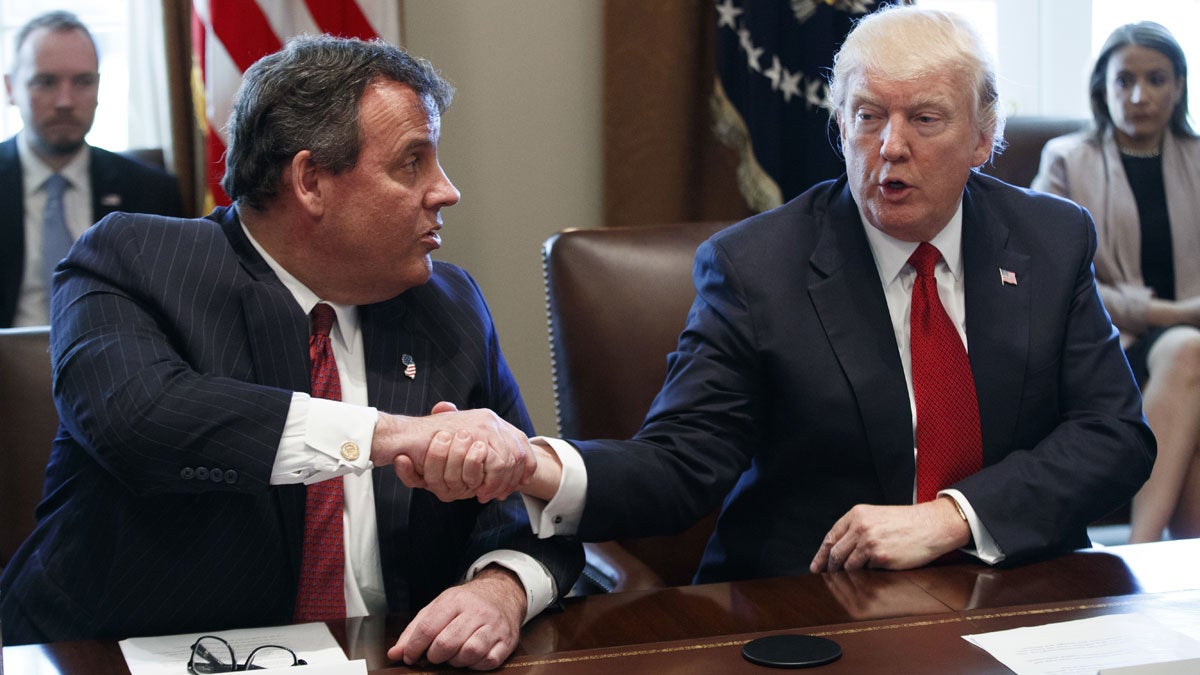Explainer: Chris Christie’s national opioid task force

President Donald Trump shakes hands with New Jersey Gov. Chris Christie during an opioid and drug abuse listening sessionWednesday, March 29, 2017, in the Cabinet Room of the White House in Washington. (AP Photo/Evan Vucci)
Perhaps borrowing a page from the playbook of New Jersey’s chief executive, President Donald Trump convened a “listening session” last week so that government officials could hear directly from drug addicts in recovery and members of the treatment community about opiate abuse in America.
And during the White House event — which featured several New Jersey residents who have been affected by addiction — Trump confirmed that Gov. Chris Christie would chair a task force the president established to address the growing epidemic, an issue that has become a priority in communities nationwide. Opioid abuse killed some 50,000 Americans in 2015, Trump said, including more than 1,500 Garden State residents.
Christie has made New Jersey’s battle to reduce addiction his signature issue for 2017; in recent years he has focused increasingly on programs to curb access to addictive prescription drugs, help addicts get treatment and recovery services, prevent overdose deaths, and reduce harm associated with the disease. In February he signed a law with the nation’s strictest opioid prescription limit, which also ensured patients with state-regulated insurance plans can get up to six months of addiction coverage.
The governor is also a longtime Trump supporter and served as part of his transition team, but — despite intense speculation for months — Christie had not played a formal role in the new president’s administration until now. That changed with the task force, which Trump outlined in an executive order signed Wednesday that created the President’s Commission on Combatting Drug Addiction and the Opioid Crisis.
The panel’s mission is to “study the scope and effectiveness of the federal response” to addiction, including identifying current federal dollars tapped for this work; assessing the availability of services throughout the country; reporting on best practices now in use; reviewing educational materials — particularly those geared toward youngsters — and evaluating the effectiveness of existing programs. This review will form the basis for an interim report, to be submitted to Trump within three months, followed with a full report due by October.
“Gov. Christie will be instrumental in researching how best to combat this serious epidemic and how to treat those it has affected. He will work with people on both sides of the aisle to find the best ways for the Federal Government to treat and protect the American people from this serious problem,” Trump said. “This is an epidemic that knows no boundaries and shows no mercy, and we will show great compassion and resolve as we work together on this important issue.”
Addiction experts, policy leaders, and elected officials on both sides of the political aisle cheered Christie’s appointment to the role. But some observers have questioned how serious Trump is about tackling addiction, noting that much work has already been done to study the issue — including a major report issued last year by the nation’s top doctor, U.S. Surgeon General Dr. Vivek H. Murthy.
Critics also note Trump proposed cutting funds for many related programs and has supported repealing the Affordable Care Act, which enabled thousands of Americans to access treatment. In addition, the president has yet to appoint leaders to several agencies that play a key role in addressing addiction issues, including the nation’s “drug czar,” who heads the Office of National Drug Control Policy — the body that will fund and provide staff to the new commission.
Trump said the new commission would work closely with the White House Office of American Innovation, led by his son-in-law Jared Kushner, another New Jersey native. But it is not clear who will serve on the panel, other than Christie. The EO notes members will be appointed by the president, but doesn’t say how many will serve or what groups they will represent.
“The members of the Commission shall be selected so that membership is fairly balanced in terms of the points of view represented and the functions to be performed by the Commission,” the order states. These positions are unpaid, although travel and other expenses will be reimbursed.
Multiple media outlets have reported the commission will also include Attorney General Jeff Sessions, Health and Human Services Secretary Tom Price, Veterans Affairs Secretary David Shulkin, and Defense Secretary James Mattis. The White House does not appear to have announced the full membership publicly and representatives did not respond to a request for comment Monday. The panel is slated to disband a month after the final report is due, unless the president extends its mission.
_______________________________________________________
NJ Spotlight, an independent online news service on issues critical to New Jersey, makes its in-depth reporting available to NewsWorks.
WHYY is your source for fact-based, in-depth journalism and information. As a nonprofit organization, we rely on financial support from readers like you. Please give today.




